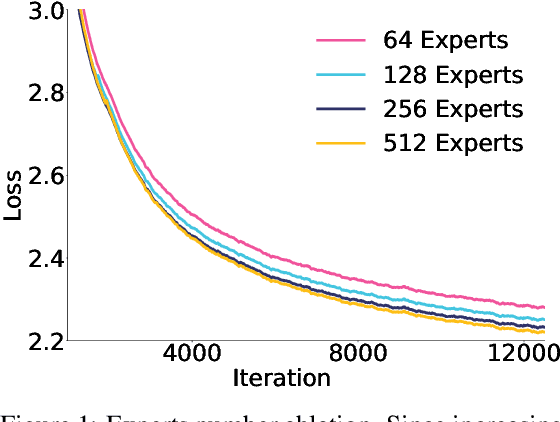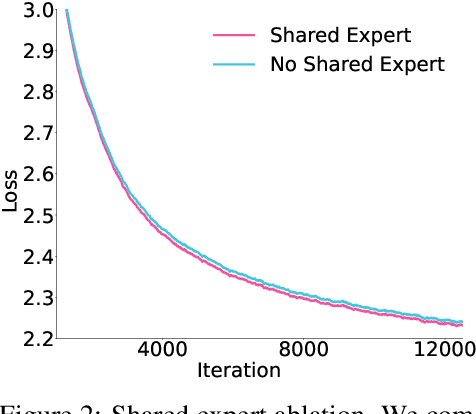Yonghan Dong
Pangu Ultra MoE: How to Train Your Big MoE on Ascend NPUs
May 07, 2025



Abstract:Sparse large language models (LLMs) with Mixture of Experts (MoE) and close to a trillion parameters are dominating the realm of most capable language models. However, the massive model scale poses significant challenges for the underlying software and hardware systems. In this paper, we aim to uncover a recipe to harness such scale on Ascend NPUs. The key goals are better usage of the computing resources under the dynamic sparse model structures and materializing the expected performance gain on the actual hardware. To select model configurations suitable for Ascend NPUs without repeatedly running the expensive experiments, we leverage simulation to compare the trade-off of various model hyperparameters. This study led to Pangu Ultra MoE, a sparse LLM with 718 billion parameters, and we conducted experiments on the model to verify the simulation results. On the system side, we dig into Expert Parallelism to optimize the communication between NPU devices to reduce the synchronization overhead. We also optimize the memory efficiency within the devices to further reduce the parameter and activation management overhead. In the end, we achieve an MFU of 30.0% when training Pangu Ultra MoE, with performance comparable to that of DeepSeek R1, on 6K Ascend NPUs, and demonstrate that the Ascend system is capable of harnessing all the training stages of the state-of-the-art language models. Extensive experiments indicate that our recipe can lead to efficient training of large-scale sparse language models with MoE. We also study the behaviors of such models for future reference.
Pangu Ultra: Pushing the Limits of Dense Large Language Models on Ascend NPUs
Apr 10, 2025



Abstract:We present Pangu Ultra, a Large Language Model (LLM) with 135 billion parameters and dense Transformer modules trained on Ascend Neural Processing Units (NPUs). Although the field of LLM has been witnessing unprecedented advances in pushing the scale and capability of LLM in recent years, training such a large-scale model still involves significant optimization and system challenges. To stabilize the training process, we propose depth-scaled sandwich normalization, which effectively eliminates loss spikes during the training process of deep models. We pre-train our model on 13.2 trillion diverse and high-quality tokens and further enhance its reasoning capabilities during post-training. To perform such large-scale training efficiently, we utilize 8,192 Ascend NPUs with a series of system optimizations. Evaluations on multiple diverse benchmarks indicate that Pangu Ultra significantly advances the state-of-the-art capabilities of dense LLMs such as Llama 405B and Mistral Large 2, and even achieves competitive results with DeepSeek-R1, whose sparse model structure contains much more parameters. Our exploration demonstrates that Ascend NPUs are capable of efficiently and effectively training dense models with more than 100 billion parameters. Our model and system will be available for our commercial customers.
CA-MoE: Channel-Adapted MoE for Incremental Weather Forecasting
Dec 03, 2024



Abstract:Atmospheric science is intricately connected with other fields, e.g., geography and aerospace. Most existing approaches involve training a joint atmospheric and geographic model from scratch, which incurs significant computational costs and overlooks the potential for incremental learning of weather variables across different domains. In this paper, we introduce incremental learning to weather forecasting and propose a novel structure that allows for the flexible expansion of variables within the model. Specifically, our method presents a Channel-Adapted MoE (CA-MoE) that employs a divide-and-conquer strategy. This strategy assigns variable training tasks to different experts by index embedding and reduces computational complexity through a channel-wise Top-K strategy. Experiments conducted on the widely utilized ERA5 dataset reveal that our method, utilizing only approximately 15\% of trainable parameters during the incremental stage, attains performance that is on par with state-of-the-art competitors. Notably, in the context of variable incremental experiments, our method demonstrates negligible issues with catastrophic forgetting.
Dense Affinity Matching for Few-Shot Segmentation
Jul 17, 2023



Abstract:Few-Shot Segmentation (FSS) aims to segment the novel class images with a few annotated samples. In this paper, we propose a dense affinity matching (DAM) framework to exploit the support-query interaction by densely capturing both the pixel-to-pixel and pixel-to-patch relations in each support-query pair with the bidirectional 3D convolutions. Different from the existing methods that remove the support background, we design a hysteretic spatial filtering module (HSFM) to filter the background-related query features and retain the foreground-related query features with the assistance of the support background, which is beneficial for eliminating interference objects in the query background. We comprehensively evaluate our DAM on ten benchmarks under cross-category, cross-dataset, and cross-domain FSS tasks. Experimental results demonstrate that DAM performs very competitively under different settings with only 0.68M parameters, especially under cross-domain FSS tasks, showing its effectiveness and efficiency.
Multi-Context Interaction Network for Few-Shot Segmentation
Mar 11, 2023



Abstract:Few-Shot Segmentation (FSS) is challenging for limited support images and large intra-class appearance discrepancies. Due to the huge difference between support and query samples, most existing approaches focus on extracting high-level representations of the same layers for support-query correlations but neglect the shift issue between different layers and scales. In this paper, we propose a Multi-Context Interaction Network (MCINet) to remedy this issue by fully exploiting and interacting with the multi-scale contextual information contained in the support-query pairs. Specifically, MCINet improves FSS from the perspectives of boosting the query representations by incorporating the low-level structural information from another query branch into the high-level semantic features, enhancing the support-query correlations by exploiting both the same-layer and adjacent-layer features, and refining the predicted results by a multi-scale mask prediction strategy, with which the different scale contents have bidirectionally interacted. Experiments on two benchmarks demonstrate that our approach reaches SOTA performances and outperforms the best competitors with many desirable advantages, especially on the challenging COCO dataset.
 Add to Chrome
Add to Chrome Add to Firefox
Add to Firefox Add to Edge
Add to Edge